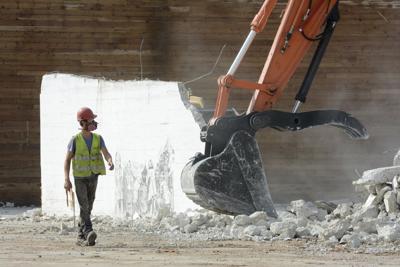EDITORÔÇÖS NOTE: This is the third of five stories counting down the five biggest local stories of 2024.
Like noxious weeds that defy eradication attempts, signs of trouble in Okanagan agriculture have become persistent features of the landscape.
Chronically low prices for apples. Steadily declining membership in farm organizations. A brutal cold snap that decimated crops. Vast swaths of land left fallow rather than used productively.
But the news this summer that sa╣·╝╩┤½├¢ Tree Fruits, a nearly century-old grower-owned co-op, had filed for bankruptcy produced a shock like no other in and around the Valleysa╣·╝╩┤½├¢ beleaguered farming community.
At a stroke, 300 growers were left with no immediate way to sell and market their fruit. Hundreds of jobs were going down at packinghouses as the economic ripple effects stretched into the tens of millions of dollars, and politicians traded accusations as to who was responsible for the parlous state of Okanagan agriculture.
But the culprit was, perhaps, not so much a ÔÇÿwhoÔÇÖ, as a ÔÇÿwhatÔÇÖ.
The co-op had its roots in the 1930s, a thoroughly different era where farming was the predominant economic activity in the Valley. By banding together to ship and sell their fruit collectively, and in fact making it impractical and difficult to do otherwise, growers had a collective power over the market they would never have had on their own.
But in recent years, the rise of privately-owned packinghouses greatly diminished the reach and clout of the co-op. The co-op was becoming land rich and cash poor, and sought to address the imbalance by selling off lucrative assets such as unneeded packinghouses and other properties like its downtown sa╣·╝╩┤½├¢ headquarters.
The ineffectiveness of that strategy was made plain in late July with a terse announcement from the BCTF that it was seeking court direction to liquidate all its remaining assets. It cited ÔÇ£extremely low estimated fruit volumes, weather effects, and difficult market and financial conditionsÔÇØ for its financial troubles.
In the middle of summer, growers were left scrambling to ensure they had a way to sell their ripening fruit.
ÔÇ£WeÔÇÖre just talking to everybody we know, to be like, ÔÇÿWhat can you take?ÔÇÖ Because weÔÇÖve got hundreds of bins of apples coming in September. Theresa╣·╝╩┤½├¢ no way we can sell that ourselves,ÔÇØ said Jennifer Diol, operator of There and Back Again Farms in sa╣·╝╩┤½├¢.
Meanwhile, there was a lot of finger-pointing as to how the BCTFsa╣·╝╩┤½├¢ financial situation had gotten so bad, apparently so fast, that it had more than $58 million in liabilities when it filed for creditor protection. Some growers disputed the BCTF boardsa╣·╝╩┤½├¢ contention that largely external factors, like a bitter January cold snap that decimated tree fruits, were to blame.
Amarjit Lalli, an apple grower, said some orchardists felt ÔÇ£the company was being mismanagedÔÇØ with high overhead costs at storage facilities and packinghouses. Thatsa╣·╝╩┤½├¢ why growers were switching to private packinghouses, said Lalli, a former member of the BCTF board.
Lalli also said there had been an ongoing power struggle for control of the co-op, which limited its effectiveness and ability to deal with the ongoing financial challenges.
With the BCTFsa╣·╝╩┤½├¢ sudden closure, there were predictions from some that a ÔÇ£carpetÔÇØ of rotting apples would litter Okanagan orchards with farmers having no viable means to sell their fruit. However, the government claimed in late summer that it had been largely successful in helping match farmers with private packers able and willing to take the fruit.
Meanwhile, the court-directed liquidation of BCTFsa╣·╝╩┤½├¢ assets is continuing at yearsa╣·╝╩┤½├¢ end, with the process at times resembling a fire sale.
Just a few weeks ago, the town of Lake Country announced that it had bought a former BCTF property in Winfield, assessed at $9.7 million for $9.1 million, though municipal officials didnÔÇÖt know exactly what they were going to do with the 8.4 acre site on Bottom Wood Lake Road that has two buildings totalling about 80,000 sq.-ft.
ÔÇ£The right time, location, and price donÔÇÖt often align, so we made sure we did our due diligence in quick order so we could direct staff to make a fair bid in the interest of the community,ÔÇØ Lake Country Mayor Blair Ireland said of the purchase.
The land might be used for recreation, or as a new RCMP site, or as an addition to a nearby arena, town officials said.
What it will never again be, of course, is a packinghouse.




